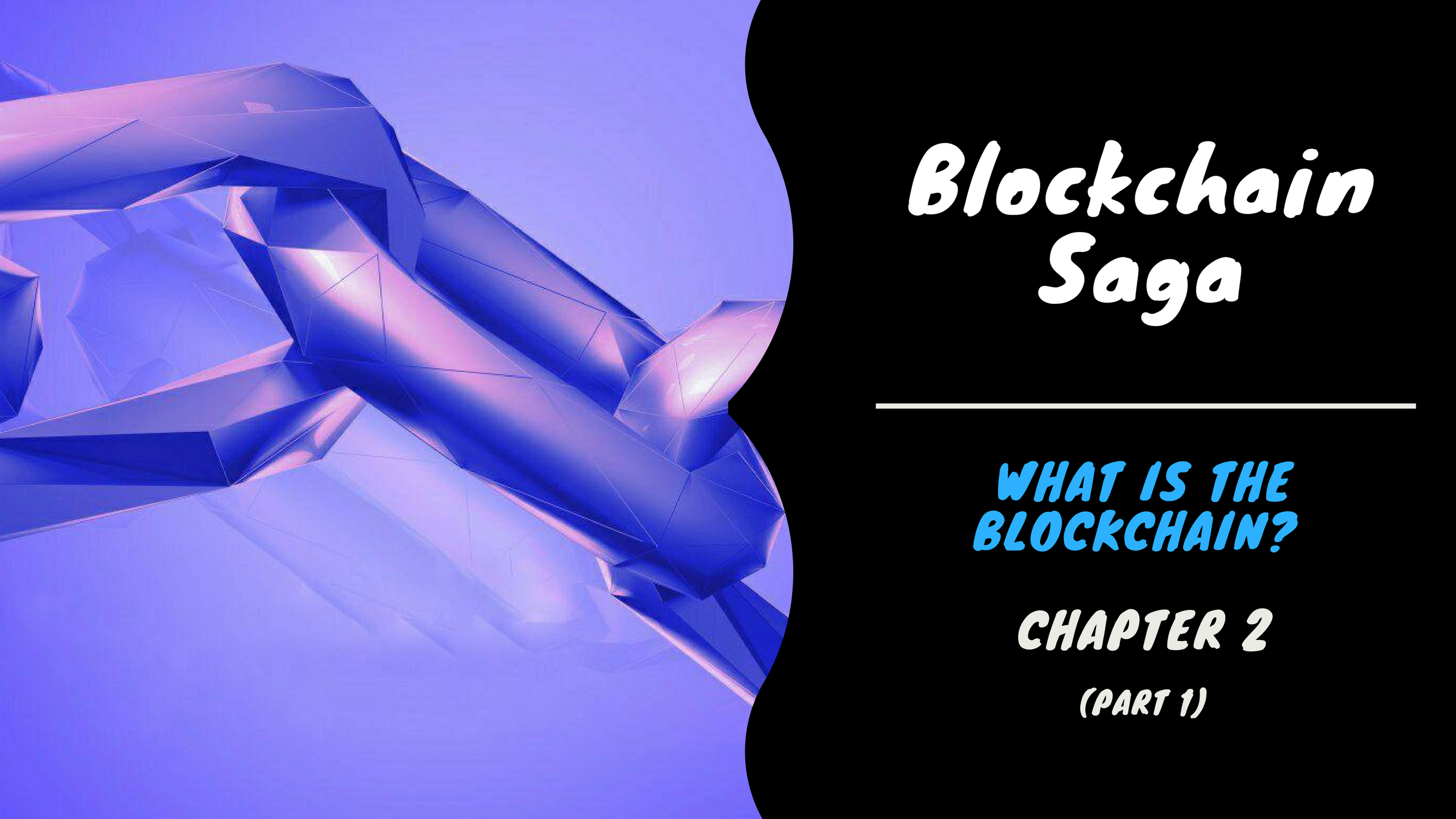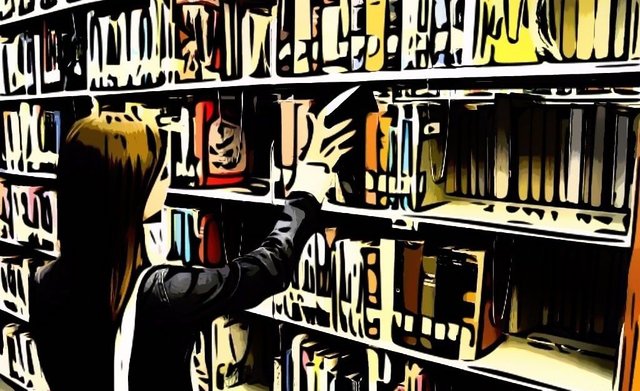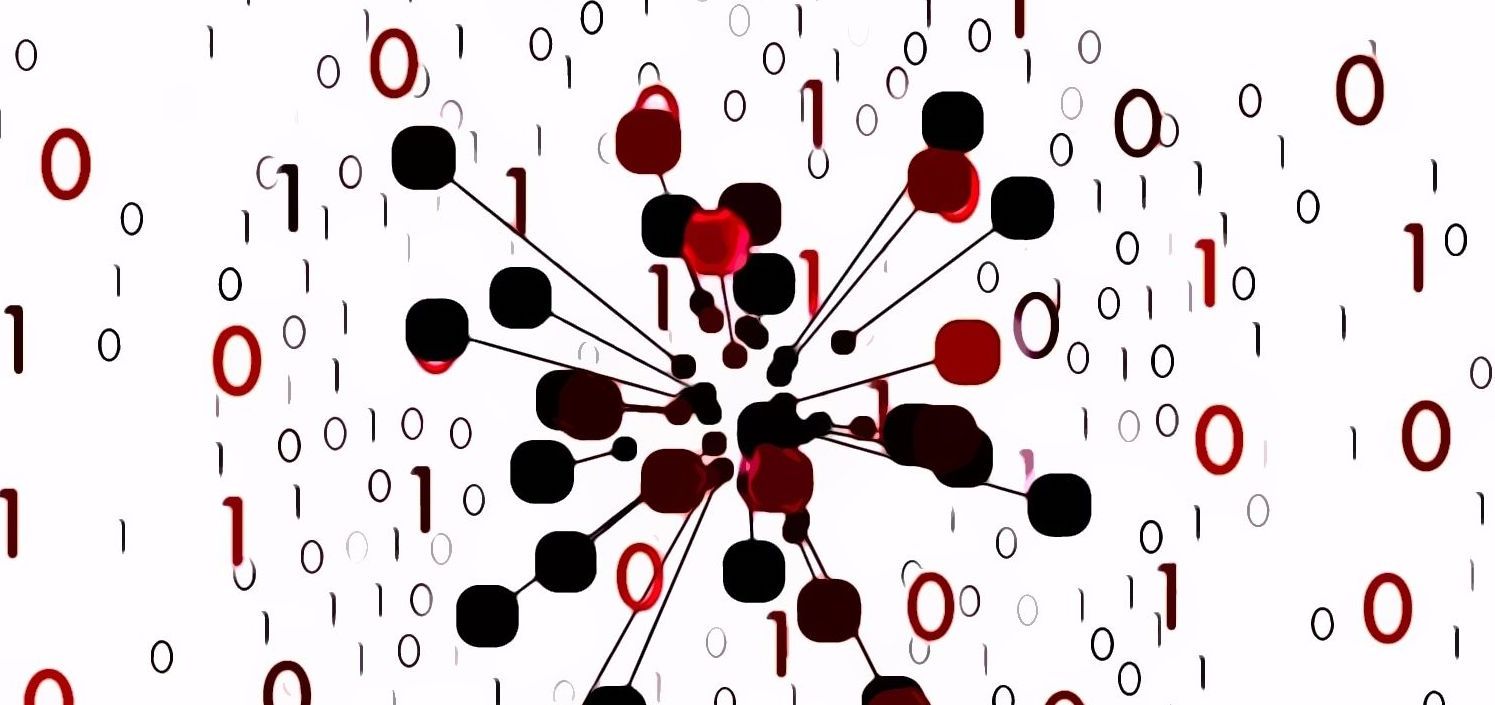Blockchain Saga - What is the Blockchain? - Chapter 2 - Part 1 [ITA ENG]

Source: image modified from Google Images copyright free
Initial chapter of the saga: click here
Tag of the saga: blockchainsaga
Many definitions move around the Blockchain: Internet 4.0, Internet Transactions, Decentralized Registry, and so on. But the real question everyone asks is "What is really Blockchain?"
The role of a central institution
We can say that Blockchain is a Database. A great database where information and transactions are saved. So what? All the hype of the moment is for a simple Database? Of course not.
Let's take a step back and analyze the case of borrowed books in the library.
Capitolo iniziale della saga: clicca qui
Tag della saga: blockchainsaga
Sono stati dati molti appellativi alla Blockchain: Internet 4.0, Internet delle transazioni, registro decentralizzato e così via. Ma la vera domanda che tutti si fanno è "Cosa è veramente la Blockchain?".
Il ruolo di un ente certificatore
Volendo semplificare al massimo, potremmo dire che la Blockchain è un Database. Una grande base dati in cui vengono salvate informazioni e transazioni. Quindi? Tutto l'hype del momento è per un semplice Database? Naturalmente no.
Facciamo un passo indietro e analizziamo il caso dei libri in prestito in biblioteca.

Source: image modified from Google Images copyright free
When we borrow a book, the library records the transaction in a database. "Alice takes the book X at 12:00 and she has to return it back the day Y". If Alice does not return the book on the day set, she will have to pay a penalty equal to the value of the book.
In this case, the library is a third party that certifies the loan transaction of a book. The same role is played by many institutes in everyday life. Among them, the best known are banking institutions or credit card companies.
These central authorities, acknowledged by the Government, guarantee citizens the security of their money and the validity of each transaction.
Even in the case of the library, Alice is sure that nobody will come back to ask her the book before the agreed date. Let's imagine now that Alice wants to borrow the same book to Bob. She should go to the library, hand over the book, and Bob should open a new transaction with the library. Also, in this case, is always required the intervention of a third party. It is because, at the base of all, there is a mutual lack of trust in a single person and we want the value we provide to another person to be publicly recognized.
And when the certification body is no longer reliable?
This is the key question that is the spark of everything. What happens when the bank or the government are entities that you can not trust anymore?
As you well know, the Real Estate 2007 crisis has shaken the foundations of a world financial system that has obvious problems. Millions of people saw their money disappear from day to day. A similar situation happens during the Greek crisis, which led the nation to freeze the savings of its citizens by avoiding withdrawals over $70 a day.
Such events undermined citizens' confidence in the big institutions, addressing the desire of many to have a different control system.
A decentralized system
The natural alternative to a centralized system is the birth of a decentralized system.
We can then refine the definition of Blockchain more and more.
The Blockchain is the technology behind a decentralized system that allows a huge distributed database to work.
It is no longer a bank or a library that will certify our transactions, but it will be all the nodes that are part of this huge system.
However, if there were 100 or more people who certify that Alice lent a book to Bob, we would be more confident that the transaction is honest.
Our confidence would no longer be in a single entity, which could also be corrupted, but in a wider system, whose chances of being malevolent are much lower.
We will analyze the details and all the questions that revolve around the Blockchain in the next chapters.
Quando prendiamo un libro in prestito, la biblioteca registra all'interno del Database la transazione "Alice ha preso il libro X alle ore 12:00 e dovrà riconsegnarlo il giorno Y". Se Alice non riconsegnerà il libro il giorno stabilito dovrà pagare una penale pari al valore del libro.
In questo caso la biblioteca è un ente terzo che certifica la transazione di prestito di un libro. Lo stesso ruolo viene svolto da molti istituti nella vita di tutti i giorni. Tra i più noti ci sono gli istituti bancari o le società di carte di credito.
Questi enti centrali riconosciuti dal Governo garantiscono ai cittadini che i loro soldi non vengano rubati e che ciascuna transazione vada a buon fine.
Anche nel caso della biblioteca, Alice è sicura che nessuno verrà a chiedergli indietro il libro prima della data di scadenza concordata. Immaginiamo ora che Alice voglia dare in prestito lo stesso libro a Bob. Da prassi, dovrebbe recarsi in biblioteca, riconsegnare il libro e Bob dovrebbe aprire una nuova transazione con la Biblioteca. Anche in questo scambio è sempre richiesto l'intervento di un terzo. Ciò perchè alla base di tutti c'è una non fiducia reciproca nelle altre persone e vogliamo che il valore che forniamo ad un'altra persona sia in qualche maniera riconosciuto pubblicamente.
E quando l'ente certificatore non è più affidabile?
Questa è la domanda chiave che ha dato il via a tutto quanto. Cosa succede quando la banca o il governo sono enti di cui non ci si può fidare?
Come ben sapete la crisi del 2007 del Real Estate ha scosso le fondamenta di un sistema finanziario mondiale che ha degli evidenti problemi. Milioni di persone hanno visto i propri soldi sparire da un giorno all'altro.
Situazione analoga con la crisi Greca, che ha portato la nazione a congelare i risparmi dei propri cittadini evitando prelievi oltre i 70$ al giorno.
Eventi del genere hanno minato la fiducia dei cittadini nei confronti delle grandi istituzioni, indirizzando il desiderio di molti a volere un sistema di controllo differente.
Un sistema decentralizzato
La naturale alternativa ad un sistema centralizzato è la nascita di un sistema decentralizzato.
Possiamo quindi raffinare sempre di più la definizione di Blockchain.
La Blockchain è la tecnologia alla base di un sistema decentralizzato che consente la gestione e l'aggiornamento di un enorme database distribuito.
Non sarà più una banca o una biblioteca che certificheranno le nostre transazioni, ma saranno tutti i nodi che fanno parte di questo enorme sistema.
D'altronde se ci fossero 100 o più persone che certificano che Alice ha prestato un libro a Bob, possiamo essere sicuri che la transazione avvenga in maniera onesta.
La nostra fiducia sarebbe riposta non più in un unico ente, che potrebbe anche essere corrotto, ma in un sistema più ampio, le cui probabilità di essere malevolo sono molto più basse.
Analizzeremo i dettagli e tutti i quesiti che ruotano intorno alla Blockchain nei prossimi capitoli.

Source: image modified from Google Images copyright free
Grazie per le delucidazioni. Chiare e scorrevoli @fboccassi resteemed
thx bro
E la saga continua! Complimenti per la semplicità delle esposizioni che risultano di gradevole lettura
Grazie @nicola71. Speriamo la saga sia di aiuto a chi vuole entrare in questo bellissimo mondo
This post has been ranked within the top 80 most undervalued posts in the second half of Sep 17. We estimate that this post is undervalued by $14.77 as compared to a scenario in which every voter had an equal say.
See the full rankings and details in The Daily Tribune: Sep 17 - Part II. You can also read about some of our methodology, data analysis and technical details in our initial post.
If you are the author and would prefer not to receive these comments, simply reply "Stop" to this comment.
:D